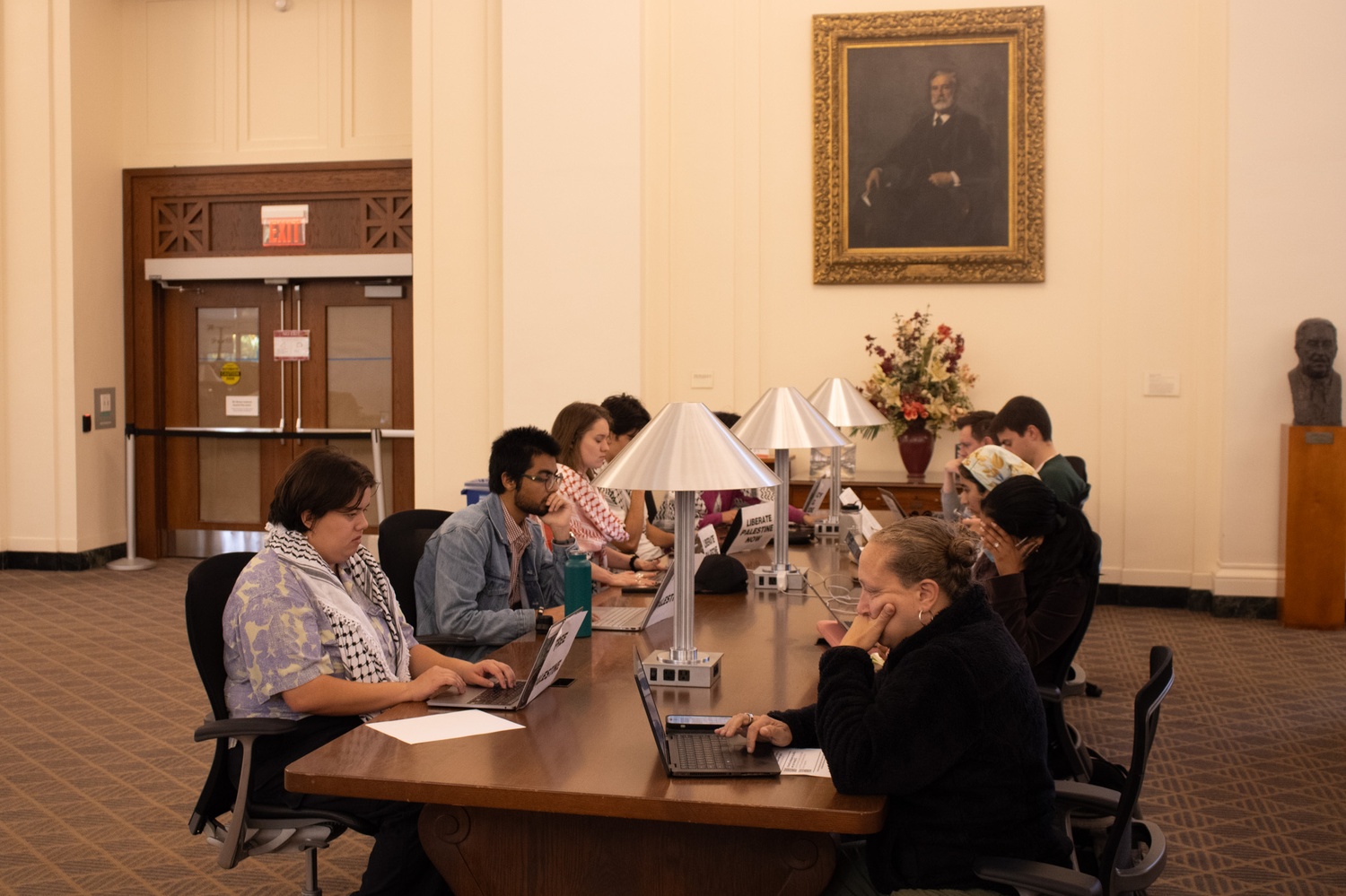
News
Harvard Grad Union Agrees To Bargain Without Ground Rules

News
Harvard Chabad Petitions to Change City Zoning Laws

News
Kestenbaum Files Opposition to Harvard’s Request for Documents

News
Harvard Agrees to a 1-Year $6 Million PILOT Agreement With the City of Cambridge

News
HUA Election Will Feature No Referenda or Survey Questions
Harvard Law School Denies Student Appeals to Reverse Library Bans

Harvard Law School administrators rejected appeals from students to reverse temporary suspensions from the school’s library in Langdell Hall over their participation in pro-Palestine “study-ins” last month, according to the school’s chapter of the National Lawyers Guild.
More than 60 HLS students were temporarily barred from Langdell, the Law School’s flagship library, late last month for their participation in a silent study-in on Oct. 17. In response, students took to the library for a second study-in on Oct. 24, prompting yet another round of bans.
According to Allie R. Ryave, the co-president of the Law School’s NLG chapter, students involved in the protests appealed their suspensions to HLS administrators, who rejected their requests to regain access to Langdell Hall.
“Students sent appeals letters saying that when they were in Langdell Library, they were not disruptive, they didn’t make noise, they didn’t diverge from the norms and policies that govern library usage,” Ryave told The Crimson.
By Monday, students began receiving rejection emails from Amanda Watson, the assistant dean for library and information services at HLS Library.
“Absent mistaken identity, meaning only that you were not a participant at the organized demonstration and have been mistaken for another person, the HLSL is applying University rules, and your suspension remains,” Watson wrote in an email to one student obtained by The Crimson.
Watson told students to direct any comments on the protest rules to Deputy Dean I. Glenn Cohen.
Silent library study-ins have swept Harvard’s campus this semester, leading to waves of temporary suspensions for HLS students, undergraduates, and even a group of faculty members.
The demonstrations — which usually involve activists silently reading or studying while taping protest slogans to their laptops and wearing keffiyehs — have posed a challenge for administrators, who are under increased pressure to show that they are unafraid to enforce Harvard’s newly-clarified protest guidelines.
In her interview, Ryave reiterated the argument that students have used to challenge the administrative response to study-ins: that simply studying in a library is undisruptive and does constitute a violation of campus policies.
“The only real disruption that day was administrators taking their identification, not any student action,” Ryave said.
She added that it appeared administrators were cracking down due to the content of the students’ views, rather than the manner of their actions.
“What if we have a ‘t-shirt-in’ where everyone wears the same t-shirt and shows up? And what if we have a birthday party where everyone wears birthday hats and happens to be in a library space on my birthday around me?” Ryave said.
“The line is almost impossible to draw without discriminating based on content, which is what it seems like the University is doing here,” Ryave added.
She pointed to an Oct. 31 Halloween event at Langdell organized by library staff as an example of a disruption to students that did not receive disciplinary action.
HLS spokesperson Jeff Neal declined to comment.
In a Monday post to their website answering “Frequently Asked Questions” about the demonstrations, Harvard Library wrote that “IDs were not requested based on clothing or the ideas being expressed.”
The post said it was enforcing the University-wide Statement on Rights and Responsibilities, which prohibits protesting in libraries or classroom spaces.
“The fact that participants read quietly does not change the fact that they are protesting or demonstrating,” the post reads. “The very point of these group actions was to draw attention—to express a point of view to others.”
The HLS NLG chapter, a progressive student association, previously supported an October ‘Disorientation’ event at HLS, which was part of a series of clashes between HLS administrators and pro-Palestine organizers over the usage of “Belinda Hall” — a student lounge in the Caspersen Center that has historically been used for student activism.
Ryave said the organization intends to continue standing up for student organizers.
“From the NLG perspective, it’s deeply concerning to our organization that the University is punishing protected speech in this way,” Ryave said. “NLG plans to support them moving forward, no matter what path they take.”
—Staff writer S. Mac Healey can be reached at mac.healey@thecrimson.com. Follow him on X @MacHealey.
—Staff writer Saketh Sundar can be reached at saketh.sundar@thecrimson.com. Follow him on X @saketh_sundar.
Want to keep up with breaking news? Subscribe to our email newsletter.
From Our Advertisers

Over 300+ courses at prestigious colleges and universities in the US and UK are at your disposal.

Where you should have gotten your protein since 1998.

Serve as a proctor for Harvard Summer School (HSS) students, either in the Secondary School Program (SSP), General Program (GP), or Pre-College Program.

With an increasingly competitive Law School admissions process, it's important to understand what makes an applicant stand out.

Welcome to your one-stop gifting destination for men and women—it's like your neighborhood holiday shop, but way cooler.

HUSL seeks to create and empower a community of students who are seeking pathways into the Sports Business Industry.
